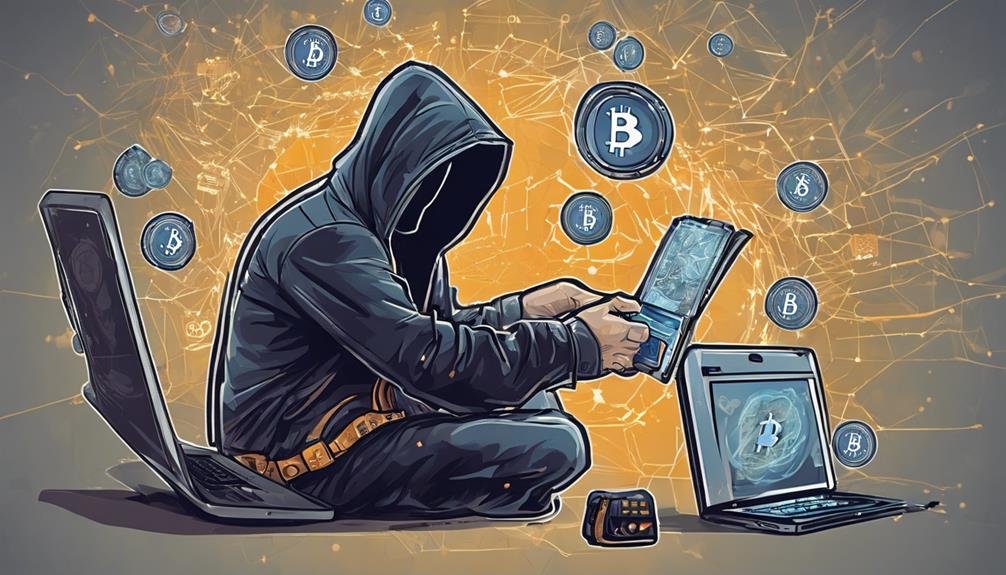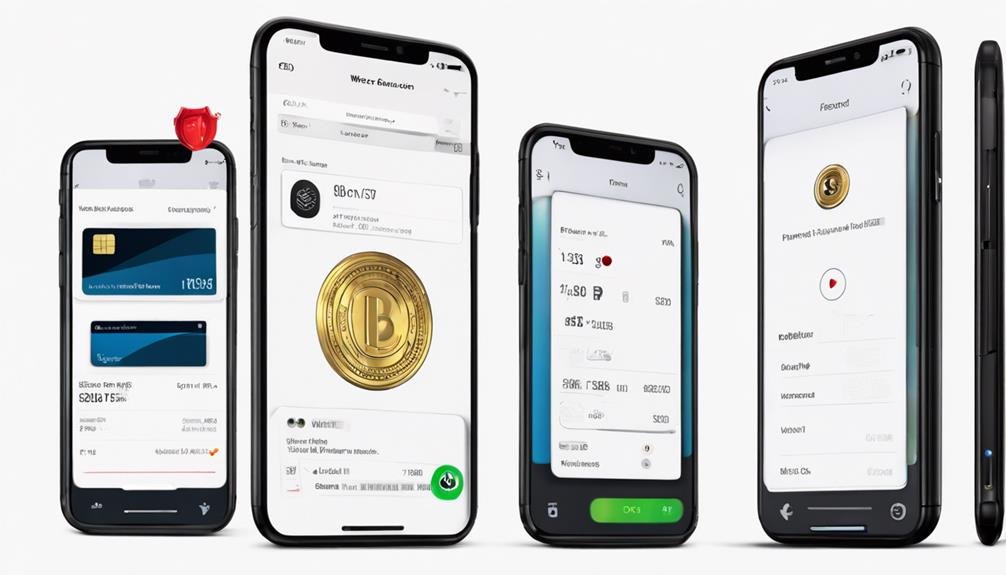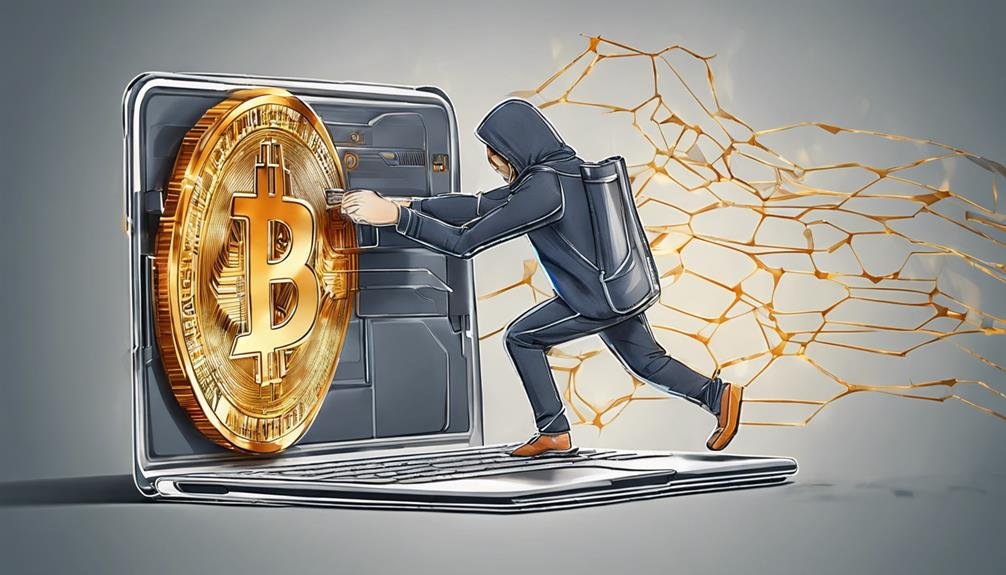Are you aware of the potential vulnerabilities lurking in your Bitcoin wallet? Securing your digital assets is paramount, but where do you start? Understanding common weaknesses and how to fortify your wallet against threats is essential for safeguarding your investments.
By implementing practical strategies and staying informed about the latest security measures, you can guarantee that your cryptocurrency remains safe and secure.
Table of Contents
Key Takeaways on Fixing Common Bitcoin Wallet Vulnerabilities
- Regularly update wallet software to address vulnerabilities promptly.
- Choose reputable wallet providers for secure storage.
- Enable two-factor authentication and strong passwords for added protection.
- Utilize hardware wallets for offline storage to enhance security measures.
Bitcoin Wallet Vulnerability Reports

Bitcoin wallet users must vigilantly monitor Bitcoin wallet vulnerability reports to safeguard their cryptocurrency holdings effectively. Security is paramount in the world of cryptocurrencies, and staying informed about potential risks is key to maintaining the integrity of your digital assets.
Vulnerability reports provide essential insights into specific weaknesses that could jeopardize the security of your Bitcoin wallet. These reports not only outline the vulnerabilities but also detail exploit methods and potential consequences if these vulnerabilities are exploited.
Understanding and addressing these risks are important for securing your cryptocurrencies. By proactively reviewing vulnerability reports, you can take the necessary steps to mitigate any potential threats to your Bitcoin wallet. Being proactive in fixing these risks can prevent unauthorized access to your funds and protect your investments.
Regularly staying informed about the latest vulnerability reports ensures that you are always one step ahead in securing your Bitcoin wallet against any potential security threats.
Common Bitcoin Wallet Security Risks

To safeguard your cryptocurrency holdings effectively, you must actively address common security risks that Bitcoin wallets face, such as phishing attacks and malware infections. Here are some key areas to focus on to enhance the security of your Bitcoin wallet:
- Implement secure password practices to create strong, unique passwords.
- Follow proper backup procedures to guarantee you can recover your wallet in case of data loss.
- Avoid using unsecured Wi-Fi networks when accessing your wallet to make certain unauthorized access.
- Be cautious with storing your wallet on exchanges to mitigate the risk of exchange hacking.
- Protect your hardware wallet from physical theft and always use secure verification processes to authenticate transactions.
Addressing Bitcoin Wallet Vulnerabilities

When addressing Bitcoin wallet vulnerabilities, it is imperative to proactively identify and rectify potential security gaps to safeguard your cryptocurrency holdings effectively. Bitcoin wallet vulnerabilities pose a significant risk, potentially leading to theft of funds and compromising the security of stored cryptocurrencies.
To address vulnerabilities, it is essential to stay vigilant against unauthorized access by promptly updating wallet software. Regular software updates help mitigate known vulnerabilities, enhancing the security of your wallet. Additionally, choosing reputable wallet providers can reduce the risk of exploitation and enhance the overall security of your digital assets.
By addressing vulnerabilities promptly and ensuring your wallet software is up to date, you can better protect your Bitcoin holdings from potential threats. Remember, taking proactive steps to address vulnerabilities is key to maintaining the security of your cryptocurrencies and preventing unauthorized access to your funds.
Best Practices for Bitcoin Wallet Security

Addressing Bitcoin wallet vulnerabilities requires implementing best practices for security to safeguard your cryptocurrency holdings effectively. To enhance the security of your crypto wallets and protect your private keys, follow these best practices:
- Use hardware wallets: Store your bitcoins securely offline with devices like Ledger Nano X or Trezor Model T.
- Enable two-factor authentication and strong passwords: Add an extra layer of security to your wallet by requiring both a password and a secondary verification method.
- Regularly backup and update your software: Keep your wallet software up to date to prevent vulnerabilities and regularly backup your wallet to avoid any data loss.
- Monitor wallet activity: Utilize blockchain explorers to keep track of your transactions and detect any unauthorized or suspicious activities.
- Consider multi-signature wallets: Increase security by requiring multiple approvals for transactions, making it harder for unauthorized transactions to occur.
Enhancing Bitcoin Wallet Security

Enhance your Bitcoin wallet security by implementing advanced measures such as multi-signature wallets and regular software updates. Multi-signature wallets require multiple private keys to authorize transactions, adding an extra layer of protection against unauthorized access. Utilizing hardware wallets like Ledger Nano X or Trezor Model T for cold storage keeps your bitcoins offline, safeguarding them from online threats.
Keeping your wallet software and firmware up to date is essential in mitigating known vulnerabilities that malicious actors could exploit. Enable two-factor authentication to secure your account with an additional verification step beyond just entering a password. Remember to back up your seed phrase in a secure location to confirm you can regain access to your funds if your wallet is lost or damaged. By incorporating these practices into your bitcoin security strategy, you can enhance the protection of your assets stored in offline storage.
Frequently Asked Questions
How Do I Safeguard My Crypto Wallet?
To safeguard your crypto wallet, guarantee password protection, use multi-factor authentication, employ hardware wallets for added security, create paper backups stored offline, employ cold storage methods, regularly update software, connect to secure networks, consider biometric verification, and use strong encryption for private keys.
What Is the Best Storage for Crypto?
For the best crypto storage, consider hardware wallets like Ledger Nano X. They offer offline security, protecting private keys from online threats. Paper wallets are secure for long-term holdings. Cold storage options like hardware wallets provide protection against hacking.
What Is a Safe Bitcoin Wallet?
For secure storage of bitcoin, you must consider cold storage like hardware wallets and paper wallets. Multi-signature wallets add layers of protection. Remember, encryption techniques safeguard private keys in offline wallets, essential for maintaining the security of your funds.
What Is a Bitcoin Safe Key?
Your Bitcoin safe key, or private key, is like the key to a vault. Protect it with hardware wallets, multi-signature security, paper wallets, cold storage, passphrase encryption, two-factor authentication, key management, offline storage, and brain wallet security.
Conclusion
Now that you have the knowledge to secure your bitcoin wallet, think of it as a fortress protecting your valuable assets. Implementing best practices and staying vigilant against potential threats will guarantee that your cryptocurrency remains safe and secure.
Remember, your wallet is the key to your digital wealth – guard it with the same level of dedication and care as you would your physical possessions. Stay proactive, stay protected, stay secure.



